AIDA64
AIDA64 implements a set of 64-bit benchmarks to measure how fast the computer performs various data processing tasks and mathematical calculations. Multi-threaded memory and cache benchmarks are available to analyze system RAM bandwidth and latency.
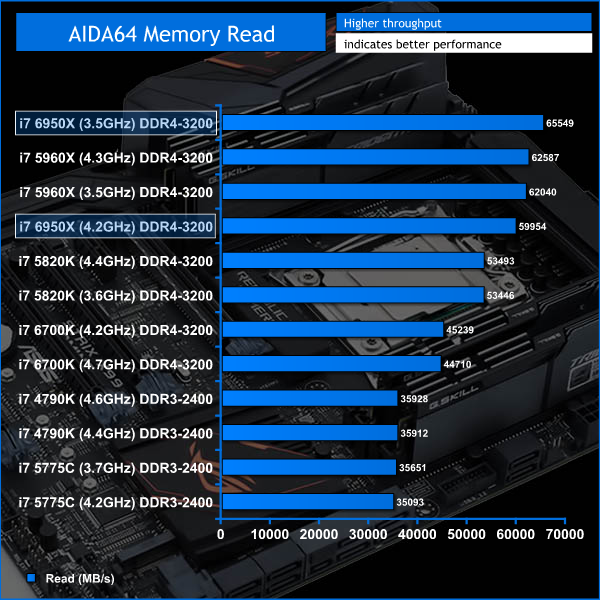
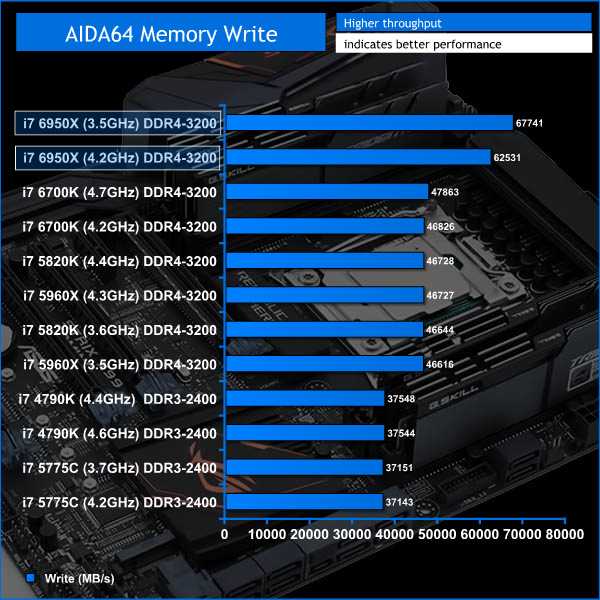
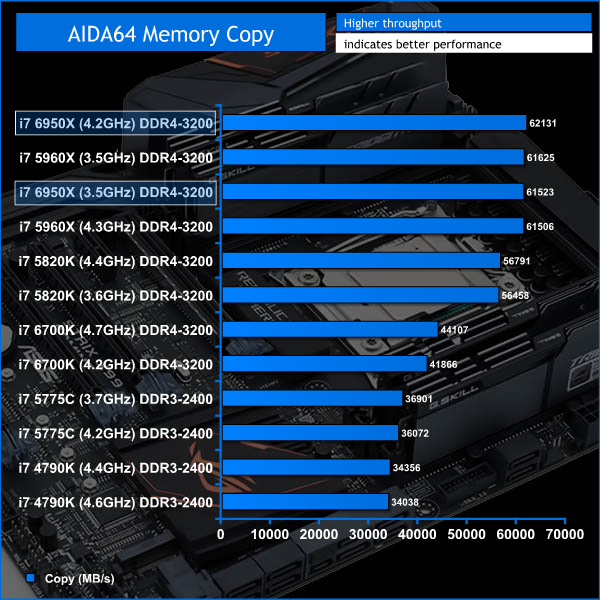
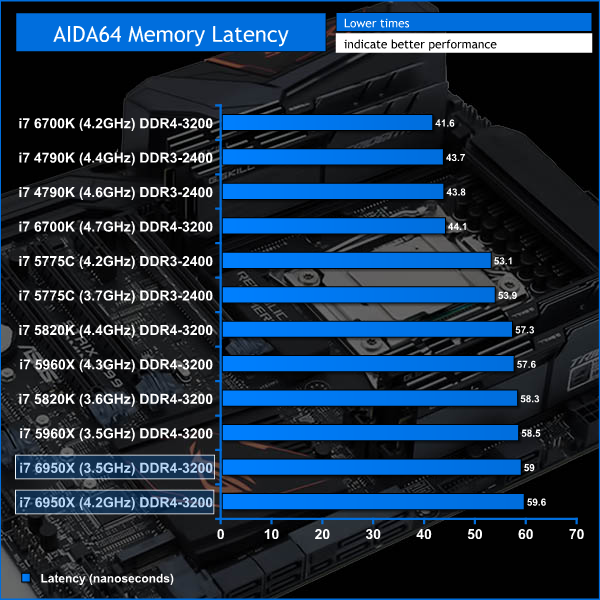
The i7 6950X offers small generational improvements in memory read and copy, and those results could be boosted further by increasing the CPU's Cache frequency as post-Haswell architectures are particularly responsive to this type of tuning. An area that showed impressive performance growth was memory write, which jumped a whopping 45 per cent over the i7 5960X.
Memory latency was roughly on par with Haswell-E and is a fair bit slower than mainstream parts as more memory channels have to be addressed, four instead of two.
SiSoft Sandra 2016
Sandra is a multi-function software utility produced by UK company SiSoftware which includes remote analysis, benchmarking and diagnostic features for PCs, servers and networks.
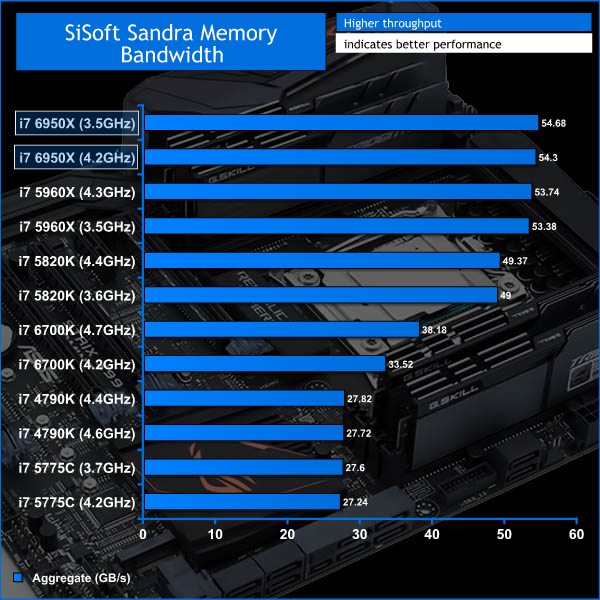
SiSoft's memory bandwidth test shows a much narrower gap between Haswell-E and Broadwell-E, though this is hardly unexpected given that both systems are quad-channel by design and are being benchmarked with the same memory kit.
 KitGuru KitGuru.net – Tech News | Hardware News | Hardware Reviews | IOS | Mobile | Gaming | Graphics Cards
KitGuru KitGuru.net – Tech News | Hardware News | Hardware Reviews | IOS | Mobile | Gaming | Graphics Cards



There is no reason why it should not be £350 for the 6950x other then intel have a monopoly, it’s a joke that they are charging £1,399 for it!
Hello ,
we all know that games dont use more than 8 threads today …
so to take advantage of an 8 cores or 10 cores CPU in Gaming you should Disable HT (Hyperthreading) and run the gaming test again to compare it against the 4 cores i7 6700K .
and tes it with SLI as well to reach the i7 6700k bottleneck !
let me put it more simple ,
The i7 6700K has 4 cores and can oc to 4.4 ghz easy . this CPU will give us 8 Virtual cores comparable to 2.2 GHZ clock for each virtual core .
However the 8 Coresi7 6900K , With the HT Turned OFF , will give us 8 cores @ 4.4 ghz EACH !
Thats double the speed of the 4 cores i7 ! if the game uses 8 threads .
EVEN if we dont OC the 8 cores , it would be 3.2GHZ VS 2.2 GHZ !!!
if you ask why Disable HT ? simple because the game will never use 16 Virtual cores !!! and the advantage is LOST .
Please run the test again for games with HT turned off .
and to stress the CPU more , TEST SLI as well , we want the i7 6700K to bottleneck !
THANKS
oh and Intel Should release i5 Broadwel-E CPU , 8 cores without HT , CHEAPER and BETTER for GAMERS
Broadwell is quite expensive.
Some of us have lives and want more than a gaming PC.
Yes there is. AMD asked for $1000+ as well for its top-end enthusiast chips when it was equal to or beating Intel in performance. These companies are not charities. Market segmentation exists both to subsidize those with lower needs and extract more profit for better return on investment in R&D. Get over it.
Newer games are using all 4 cores and all 4 threads on the 4790k. They are usually hitting 35-50% on all cores/threads. On top of it, as Etzel pointed out, the 25mb of cache will make a HUGE difference. Now with that said, I would never spend this kind of money (with my income that is, lol), on just a gaming cpu. This is much more a workstation cpu w/probably great gaming as a perk.
This is overkill x4 for an exclusive gaming rig.
If you look carefully, this site focuses on pc gaming as well. and they are still having lives ! probably more than your live.
I don’t see the value in disabling hyperthreading, by that logic the Core i5 will be faster than the Core i7 at the same clock speed because it doesn’t have hyperthreading? I think I’ve seen enough comparisons to know that isn’t the case.
However, your second point about SLI is valid. It’s something we’d like to test (the benefits of BDW-E vs Skylake for 2/3-WAY GFX) but I didn’t have the time for it, maybe KitGuru will investigate it in future.
Thanks for your feedback.
Actually you got it wrong !
i7 and i5 both have 4 cores … I am talking about 8 cores vs 4 cores !
the right comparison is i3 VS i5
i3 and i5 are BOTH 4 threaded CPU
i3 with HT (4 virtual cores) and i5 without HT(4 real cores) and we all know that i5 is faster than i3 in games.
the same in i7 6700k (4 cores/8 threads) VS i7 8cores with HT disabled .
give it a try
Oh shut up, you’re spewing PURE nonsense here lmao. Charity? REALLY? Are you that dense? Intel is making a fucking KILLING even at their old prices! The ONLY reason Intel gets away with these DISGUSTING ripoff gouged prices is because AMD hasn’t made a competant CPU in years! And AMD is JUST AS GUILTY of price gouging when they charged $1,000 for their ripoff FX 9590 that was literally the SAME thing as an FX 8350 with a 4.7ghz overclock put on it out of the box…that’s IT! how is that worth $1,000? Even the 5960X wasn’t worth $1000 when you could get a 6 core 12 thread for half that cost, two cores is NOT worth an extra $599!!!! (the 5960X went for ~$1,089 in most places vs. ~$500 for the 5930K) and 2 more cores + 12 pci lanes is DEFINITELY not worth an extra $750!!!
The 4960X was the exact same nonsense, but even worse really…it was LITERALLY THE SAME DAMN THING as the 4930K, 6 cores on both, 40 pci lanes on both, etc..etc.. the ONLY difference was that the 4960X stock clock speed was a measly 200mhz more….for $500 more!!!!!
And now we’ve graduated to two cores more being $800 more price!!!
If we compare mainstream to HEDT offerings over the years we see that Intel can EASILY make a KILLINg off of you with MASSIVE profits with WAY less of a price gouge than they are doing now.
Mainstream Ivy Bridge-S:
i5 3570K 4 core/4 thread 6mb L3 cache = ~$220 on release.
i7 3770K 4 core/8 thread 8mb L3 cache = ~$320 on release.
($100 extra for 4 more virtual cores/threads!!!)
HEDT Ivy Bridge-E:
i7 4820K 4 core/8 thread 10mb L3 cache = ~$310 on release. (Yes…we literally paid LESS for the 4820K with 2mb of extra L3 cache, a soldered on die that improves temps as much as a dangerous “de-lidding” would, up to 15 degrees in most cases, and gives you 40 pci lanes instead of a measly 16….for LESS money!!!!)
i7 4930K 6 core/12 thread 12mb L3 cache = ~$550 on release (So we’re paying $230 more than i7 3770K for two more cores and four more threads and 4mb more L3 cache, and 24 more pci lanes, and the better soldered die temperatures etc.. for only $230 more)
i7 4960X 6 core/12 thread 15mb L3 cache = ~$999 on release (this was the first case of ridiculousness by intel. We get NO extra cores; all we get over 4930K is 3mb more L3 cache and 200mhz higher base/boost clock speed out of the box….for $450 more)
Haswell-S:
i5 4670K and 4690K 4 core/4 thread 6mb L3 cache = ~$225 on release
i7 4770K and 4790K 4 core/8 thread 8mb L3 cache = ~$310 and $330 on release
(So we’re paying again, only $85 more for 4770K and only $105 more for 4790K over the 4690K. And we’re getting FOUR more virtual cores/threads, and 2 more mb of L3 cache etc.. as well as the improvement in temps if you move from regular 4670/4770 to the 4790K Devils Canyon.)
Haswell-E:
i7 5820K 6 core/12 thread 15mb L3 cache = ~$375 on release (uh-oh…now we’re getting a difference here….we’re only paying $50 more than 4790K and getting TWO more cores and FOUR more threads, 7mb more L3 cache, 12 more pci lanes (28 vs 16) etc.. for only $50 more than 4790K)
i7 5930K 6 core/12 thread 15mb L3 cache = ~$559 on release (paying just under $200 more for literally nothing but 12 more pci lanes (40 vs 28)…same 6 cores 12 threads, same 15mb L3 cache, basically same clock speeds etc..etc..etc… This is intel’s SECOND recent ridiculous business practice)
i7 5960X 8 core/16 thread 20mb L3 cache = ~$1050 on release (Whoa there! What happened!?!?! We went from only paying ~$185 more to get two more cores and four more threads along with 12 more pci lanes and 7mb of extra L3 cache etc.. going from 4790K to 5820K…..to paying a whopping $530 extra for just two extra cores + 4 extra threads and 5mb of extra L3 cache…..it’s the SAME chip otherwise though! Same 40 pci lanes, actually SLOWER stock/boost clock speed of 3.0/3.5ghz, less overclocking potential in general, same Haswell-E architecture etc..etc…. so WHAT went wrong? Why is the 5960X THREE TIMES MORE EXPENSIVE for the SAME spec improvement that used to cost under $200 and only as little as ~$100 or so a generation before that?!?!?! GREED…that’s what!)
Broadwell-S:
i5 5675C = $279
i7 5775C = ~$366
(Same old Same old. 2mb increase in L3 cache, four extra threads. etc..etc.. between the i5 and i7. Broadwell-S was a flop in the desktop market basically. Shouldn’t even be on the list, i put it here for completions sake)
Skylake-S:
i5 6600K = $219 on newegg right now
i5 6700K = $329 on newegg right now (2mb extra L3 cache and four extra threads again (8mb on i7 vs 6mb on i5. same old same old. 300mhz extra boost speed if it matters. Only a $110 increase in price for these boosts)
Broadwell-E:
i7 6800K 6 core/12 thread 15mb L3 cache = $450 MSRP selling for that exact price on multiple stores now.
(We get TWO extra cores, FOUR extra threads, 7mb more L3 cache, and 12 more pci lanes over BOTH the i7 5775C BW-S and the i7 6700K Skylake-S for only $85 more than the i7 5775C and only $110 more than the NEWER ARCHITECTURE i7 6700K….but….somethings off here isn’t it? We are now $75 MORE than the 5820K despite it being literally the EXACT same thing!)
i7 6850K 6 core/12 thread 15mb L3 cache = $650 MSRP (We only get a measly 12 more pci lanes, and NOTHING else….for $200 extra….WHAT A GREAT DEAL AMIRITE?!?! -___-)
i7 6900K 8 core/16 thread 20mb L3 cache = $1099 MSRP
(So we have a 5960X that overclocks worse, draining EVERY ounce of the extra 10% performance broadwell-E gives over haswell-E….with the SAME specs as 5960X…for $50 more than a new 5960X went for when it released. Compared to 5930K we get two more cores, four more threads, 100mhz LESS boost speed, 5MB more L3 cache and nothing more…for $450 more! Ripoff….)
i7 6950X 10 core/20 thread 25mb L3 cache = $1,750 MSRP
Here’s the source of the post. So we’ve got….just two more cores and four more threads….and 5mb more L3 cache….so literally the SAME difference between the 6850K and 6900K or the difference between 5930K and 5960X that only cost $200 extra to get.
But we pay SEVEN HUNDRED AND FIFTY FUCKING DOLLARS MORE FOR THE SAME $200 WORTH OF SPECS INCREASE!!!!!!!!! $750!!!!!! HOW ARE YOU EVEN VAGUELY NOT UNDERSTANDING HOW DISGUSTING THIS IS?!?!?!
God you have NO clue what you are talking about lol. Hyperthreading does NOT run your cores at half speed lol. When you run an overclocked 5960X 8 core 16 thread CPU you get 8 cores running at 4.5ghz (assuming you can overclock that high, mine does.) and you get 8 virtual threads which are running at that same 4.5ghz speed. PERIOD! That’s just how it is. You need to go learn about what hyperthreading actually is.
Dude, what are you talking about? Hyperthreading runs two threads on one core. Basically the workload shares a core. This does mean that a single thread is running slower on hyperthreading, because it’s sharing the workload. I don’t think you actually understand hyperthreading. Chances are you would benefit from disabling your HT if you don’t use a lot of multithreaded applications. For gaming, it would be beneficial with HIGHER CORE count processors. My 6950x certainly benefited. I’ll make sure to draw up some benchmarks for you.
From the way you describe it HT somehow magically makes everything faster.. Thats not how it works. Hyper-Threading is not the same as doubling the number of cores on a processor. Hyper-Threading was designed to execute more commands at one time. With ten cores, you do not need to be running 20 threads at one time at the speeds we’re at. Sorry to go against the grain here but HT was great in the dual core era, not so much anymore.
Also Hyperthreading doesn’t run at “Half-speed” as you might have read, but it does run the threads parallel that could have a negative impact on speed. However synthetic benchmarks sing HT praises so I guess we’ll go with that.
I think you responded to the wrong guy. I’m not the idiot who said hyperthreading causes your CPU to run at half speed and that an i3 has only 4 virtual cores but no real ones lol.
The fact of the matter is, Hyperthreading has ZERO effect on the specifications of your CPU. It is simply a VIRTUAL representation of a thread. It uses software to allow the same instruction to replicate itself a 2nd time on a single core still within the course of ONE single CPU clock cycle. In words that you can understand: the Intel core is a man running in a race, who finishes If the guy were to fire up a “time machine” of sorts and makes a ghost of himself finish the race alongside him then we would have two “people” completing the race, meaning the same workload was done over again, but since he’s still the same person it would be attributed to only one “source” so to speak. And the “ghost” could have easily veered off and done a different race, “killing two birds with one stone”. That’s the issue here. You claim that hyperrheading “shares a core” which is wrong, only AMD’s terrible “Cluster Multi-threading” used in it’s “Module” system on the FX Bulldozer/Piledriver/VIshera etc.. CPUs does that. Intel uses Simultaneous Multi-threading, which is far different in that there is no unified front end and required sharing of all resources.
That’s the purpose of hyperthreading. It’s simply a software implementation of a physical integer core, that can help you when other cores are tied up. Nobody said anything about hyperthreading being some ultimate thing that doubles the power of your CPU. Obviously in single threaded loads there is no benefit to hyperthreading. But the amount of workloads where hyperthreading being turned OFF will benefit you is far smaller than you would think. Most games nowadays can take advantage of all four cores in a quad core i7; which is why you see i7’s pulling ahead of i5’s on modern GPUs like the GTX 1080 and TITAN XP. (that and the 2mb of extra L3 cache, but that’s a rather small benefit in comparison)